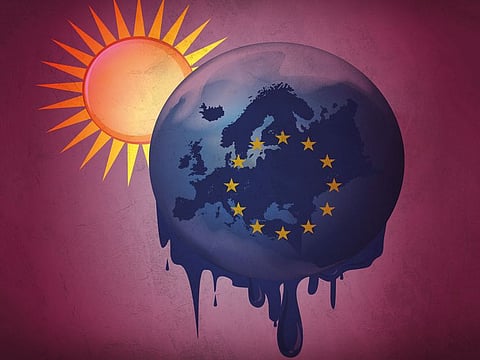Parched Europe pays the price for ignoring climate change
Global warming is definitely a bigger threat the world is facing than Covid

Just when the world thought it was finally out of the woods from coronavirus, ‘mother nature’ struck again — this time in the form of drought and in the heart of Europe — probably the worst in half a millennium.
These headlines are frightening, almost out of a fictional disaster movie. “Europe battles water shortages as severe drought sweeps the continent,” says the Financial Times. “Europe’s rivers run dry as scientists warn drought could be worst in 500 years: Crops, power plants, barge traffic, industry and fish populations devastated by parched waterways,” says the Guardian.
A UN report said around 74 per cent of natural disasters between 2001 and 2018 were water-related, including droughts and floods. The frequency and intensity of such disasters are only expected to increase with climate change.
Record high temperatures and the lack of rainfall have left most European countries struggling with droughts this summer. Experts warn that the drought will have immediate and long-term devastating effects on agriculture and food security, industrial production, health and water supplies. Climate change is in play in its most destructive ways, shall we say?
That is exactly what the European Drought Observatory says. In its latest release, it said the drought “threatens 60 per cent” of Europe, including the UK, “exacerbated by climate-change driven record heat across Europe this summer.” There is also an “increased fire danger due to the lack of rain and the resulting dry vegetation, combined with high temperatures,” the European Union’s Copernicus Climate Change Service says, noting that wildfires continue to burn across Europe.
In England, the past July was the driest since 1935. A picture in the Daily Telegraph told the story: it is of a sign outside a popular supermarket that says customers cannot buy more than three 500ml bottles of water for the sake of other customers! Municipalities across the land banned outdoor hoses.
Most severe recorded drought in France
The French government set up a crisis team to tackle what it described as a “historic drought” that has left more than 100 municipalities short of drinking water. French Prime Minister Elizbeth Borne has issued an official stark warning: “This drought is the most severe recorded in our country.”
In France and other parts of Europe, famed rivers, where people tend to spend nice quality times in the summer and move goods via freight ships, are being reduced to trickles. The Loire, the longest river in France with a length of 1,006 kilometres, can now be crossed on foot in some places!
The Rhine in Germany, one of Europe’s key waterways for industrial shipping, also plummeted. A week ago, German authorities warned that the river was just “days away from being closed to commercial traffic because of abnormally low levels of water caused by drought.” Freight ships on the river have been forced to sail 75 per cent empty, local media said. The estimated loss will be in the dozens of billions of euros.
The Drought Climate Services in Italy said that last month was “the driest July in the country since 1800.” And things will only get worse as “the drought persists and months pass without rain.” In the Netherlands, Minister of Infrastructure and Water Management Mark Harbers called on everyone to “shower quicker and not to wash their cars or water the garden,” as the country declared last Wednesday “an official water shortage.”
And in far away Mexico, the drought’s impact is being felt by many vulnerable communities. Water has become a rare commodity in the north of the country. Millions of people in the city of Monterrey today lack drinking water. The authorities designated the water shortage as a matter of national security.
We cannot say that Europe had it coming. But the rise of the right in most Europe countries with conspicuous anti-climate agendas, similar to those of Donald Trump or may have been inspired by him, has left the continent vulnerable to the impact of the global warming that disrupted weather patterns and led to extreme weather conditions such as floods and drought. These weather conditions, brought out by climate change, “are projected to affect availability and distribution of rainfall, snowmelt, river flows and groundwater, and further deteriorate water quality,” a report by the United Nations warned exactly a year ago.
It said that more floods and severe droughts are predicted. And the changes in water availability will certainly impact health and food security and “have already proven to trigger refugee dynamics and political instability.”
Another UN report said that “around 74 per cent of natural disasters between 2001 and 2018 were water-related, including droughts and floods.” The frequency and intensity of such disasters are only expected to increase with climate change.
Today, it is Europe that suffers from water shortage — with all its advanced system and innovative technology. Just let us imagine the devastating results of such a calamity on less developed countries.
When the Covid-19 hit China in late 2019 and became a global pandemic by the first two months of 2020, the world came together in its efforts to defeat the pathogen. Urgent measures and rich-to-poor aid helped humanity overcome the deadliest virus in recent times. The virus has so far killed 6.5 million people worldwide.
Climate change is definitely a bigger threat. It has the ability, through its multifaceted impacts, to wipe life out on this planet. History says mother nature had done that before. We are literally killing the planet. And, through its complex mechanism and absolute power, it is killing us back. The key word is climate change.
Sign up for the Daily Briefing
Get the latest news and updates straight to your inbox



